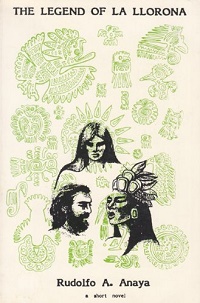The Legend of La Llorona: A Short Novel

Marina, approximately 1505-approximately 1530 Fiction.
Marina, approximately 1505-approximately 1530.
Conquest of Mexico (1519-1540)
Indians of Mexico Fiction.
Indios de México Novela.
Indians of Mexico.
Mexico History Conquest, 1519-1540 Fiction.
México Historia Conquista, 1519-1540 Novela.
Mexico.
Fiction.
History.
1519-1540.
A short novel published in 1984, in which Anaya reconstructs the famous story of La Llorona, delving into the tale's historical origins, mythological powers, and communal functions.
Throughout Mexico and wherever Hispanics live, the legend of "La Llorona" has been told for generation upon generation. There are as many versions of the tale of the Wailing woman are story tellers. In this short novel by Rudolfo Anaya, the story assumes historic proportions. The author suggests that the first Llorona of the New World was Malinche, the consort of the Spanish conquistador, Cortez. In Anaya's version of the story, Malinche rises to noble and tragic stature. The legends of the world have been born of human experience. Over time, and in the telling and retelling, the people in the world's legends have tended to become suprahuman, mythological. To return such legendary people to their original roots, and thereby make them human again, requires a story-teller of considerable, if not exceptional, talent which encompasses an understanding of humanity that transcends time, place, language and culture. This precisely is what Rudolfo Anaya has accomplished in this, his most recent work, The Legend of La Llorona. Based on the ancient Mexican legend, Anaya has rendered the story in the form of a brief novel. In doing so, Mr. Anaya has given us a work not unlike those of the great Greek tragedies of Oedipus, who killed his father and marries his mother, and Medea, who killed her own children. Joseph Campbell, in his Historical Atlas of World Mythology, noticed the remarkable similarities between the myths of the world and concluded, "Through its millions of apparently separate individuals, the human race evolved in the way of a single life." Now, thanks to Rudolfo Anaya's creative re-creation of The Legend Of La Llorona, it appears that the ancient Mexicans and the ancient Greeks were not so different after all. Through their legends, and now through the artistry of Rudolfo Anaya, they speak to us about the ways and about the unity of humankind. -- from book's back cover
